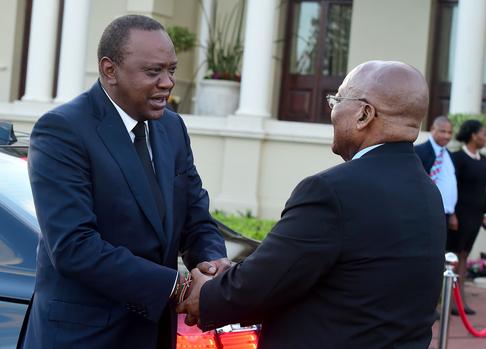Johannesburg – It is hard to imagine a situation in which, as a South African editor, I would have to sleep on the floor of my office in down-town Pretoria, fearing arrest by plainclothes police officers camped outside the building.
They say it could never happen in democratic South Africa – for media houses to be shut down and editors arrested in their homes and offices. Let’s hope it never does.
But that’s what we all thought about Kenya – supposedly another beacon of democracy on the continent with a robust media that had reported freely since the end of former president Daniel arap Moi’s rule. But no more. Those days are long gone.
Some of my media colleagues in Kenya were sleeping on the floors of their offices on Wednesday for fear of arrest as plainclothes police officers camped outside. This is really a dark day for media freedom in Africa.
To think that Kenya’s President Uhuru Kenyatta has just been in South Africa for the ANC’s 106th anniversary on January 8 and was given a rousing welcome as “Comrade Kenyatta”. Little did we think that less than a month later journalists in his country would fear for their wellbeing and freedom.
The African Editors Forum, of which our own Jovial Rantao is chairperson, has “condemned in the strongest possible terms the outdated, draconian and deplorable act by the government of Kenya to muzzle the media covering an event organised by opposition leader Raila Odinga”.
That event was characterised by some as a “stunt” by the opposition, which held a mock presidential swearing-in ceremony for Odinga on Tuesday. The opposition remains aggrieved by what they see as a sham re-run election in October.
In September, Kenya’s supreme court annulled the August presidential election due to a botched count, and ordered a re-run. But the opposition boycotted the re-run as the electoral commission said they could not guarantee a proper ballot and judges were being intimidated. As a result, Kenyatta commenced a second five-year term.
The government called the mock swearing-in ceremony treason, but to the thousands of opposition supporters at the event it was an expression of dissatisfaction with the current state of affairs in the country. The National Super Alliance, led by Odinga, has said it has launched national resistance against a government not elected according to the constitution.
What appears to be happening is that Kenyatta and Odinga are engaged in a high-stakes game of brinkmanship in a polarised country.
But what cannot be tolerated is the muzzling of the media at a time when the Fourth Estate is needed more than ever to do its duty of informing the public of what is happening in the country.
As the African Editors Forum statement noted, the presence of media (at an event) is neither an indication of support nor lack thereof, but is a constitutional duty to record for the public events of major interest and importance. For the Kenyan government to shut down independent television and radio stations that covered the event, which was of major public interest, signals intolerance and a slide towards authoritarianism. The censoring of views or events it does not agree with is an abuse of power.
The media in Kenya has worked tirelessly to ensure the democratic space is safeguarded and accessible, and has fought hard against political interference and media capture.
It is distressing that independent media stations, such as Citizen TV, Inoora TV, Kenya TV Network and NTV (owned by the Nation Media Group), have been muzzled. Only the state-owned Kenya Broadcasting Corporation and K24 were allowed to continue broadcasting. K24 is owned by Mediamax, of which the Kenyatta family are one of three shareholders.
The government’s action underlines a trend since 2013 when Kenyatta first took office. Government officials have harassed and threatened media organisations, journalists and bloggers writing on sensitive subjects. Human Rights Watch has documented 17 incidents in which 23 journalists and bloggers were physically assaulted by government officials or individuals aligned with them from 2013 to 2017. Social media has become the only platform where Kenyans can access independent information.
If media freedom is a barometer for general freedom in any given country, then we should treat the latest developments with the seriousness they deserve. On Thursday, Kenya’s high court suspended the media shutdown after activists took the matter to court citing it as a gross violation of the constitution. To date, the government has not complied with the court ruling.



